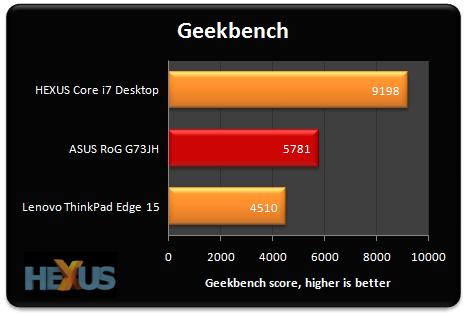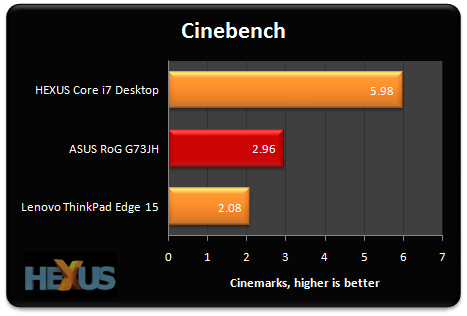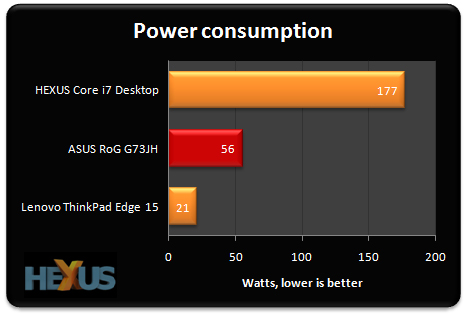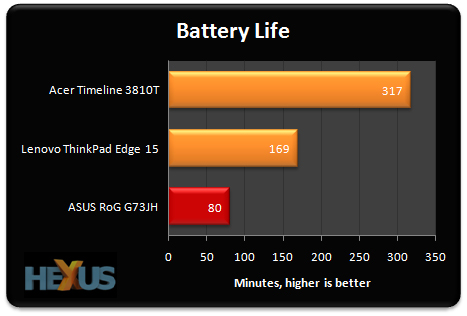Performance
ASUS's RoG G73JH is the first gaming notebook to be subjected to our revamped benchmark suite.
We'll endeavour to add results for other competing solutions in the near future, but in the meantime, we'll provide comparative results from a mid-range Lenovo ThinkPad Edge 15, as well as our familiar desktop test platform; consisting of a Core i7 processor and ATI Radeon HD 5870 graphics.
We don't expect the G73JH to match the desktop, of course, but we're interested in seeing how the numbers compare.
In addition to our usual notebook benchmarks, we'll also be running a selection of 3D games to test ASUS's gaming credentials.
Here's a summary of our comparison systems and benchmarks:
Comparison systems |
|||
|---|---|---|---|
| Laptop | ASUS RoG G73JH | HEXUS Core i7 Desktop | Lenovo ThinkPad Edge 15 |
| Processor | Intel Core i7 720QM (1.60GHz, 6MB L2 cache, quad-core) | Intel Core i7 965 EE (3.20GHz, 8MB L3 cache, quad-core) | Intel Core i5 430M (2.26GHz, 3MB L3 cache, dual-core) |
| Memory | 8GB DDR3 1,333MHz | 6GB DDR3 1,066MHz | 4GB DDR3 1,066MHz |
| Graphics | AMD ATI Mobility Radeon HD 5870 1GB | AMD ATI Radeon HD 5870 1GB | Intel HD Graphics |
| Graphics driver | ATI Catalyst 10.6 | ATI Catalyst 10.6 | Intel 8.15.10.2057 |
| Display | 17.in - 1,920x1,080 | 30in Dell monitor - 2,560x1,600 | 15.6in - 1,366x768 |
| Battery | 8 cell, 75Whr | N/A | 6 cell, 48Whr |
| Weight | 3,912g (including battery) | Bloody heavy | 2,476g (including battery) |
| Wireless | Atheros AR9285 (802.11bgn) and Bluetooth 2.1 | N/A | Intel WiFi Link 1000 (802.11bgn) and Bluetooth 2.1 |
| Disk drive | 2x Seagate Momentus 500GB, 7,200RPM, 16MB cache | 120GB OCZ Vertex SSD | Seagate Momentus 320GB, 5,400RPM, 8MB cache |
| Optical drive | Blu-ray/DVD RW combo | Generic DVD-RW | DVD-RW |
| Operating System | Microsoft Windows 7 Home Premium, 64-bit | Microsoft Windows 7 Ultimate, 64-bit | Microsoft Windows 7 Professional, 64-bit |
General Benchmarks |
|||
| Geekbench 2.1.6 | A cross-platform benchmark used to measure memory and processor performance. Run using high-performance mode. | ||
| Cinebench 11.5 | Using Cinebench's multi-CPU render, this cross-platform benchmark stresses as many cores as possible. Run using high-performance mode. | ||
| Battery test | In order to measure battery life, we run the notebook on balanced power settings and loop a 720p movie trailer, measuring the time taken to hibernate. | ||
| Power consumption | Using balanced power settings, we record mains power draw whilst playing back a 720p movie trailer. | ||
GPU Benchmarks |
|||
| 3DMark06 | A PC benchmark used to test the DirectX 9 performance of a system's graphics card. Run using high-performance mode. | ||
| Aliens vs. Predator | DX11, 1,920x1,080, 2xAA, 8xAF, very high quality. | ||
| Call of Duty: Modern Warfare 2 | DX9, 1,920x1,080, 4xAA, ultra quality, FRAPS-recorded benchmark. | ||
| DiRT 2 | DX11, 1,920x1,080, 4xAA, ultra quality, London map. | ||
| GPU Temperature | To find out how well the G73JH is cooled, we run the GPU-intensive Furmark stress test and record GPU temperature after 10 minutes. | ||


General system performance, as expected, is very decent. The Core i7 720QM - able to Turbo Boost up to 2.8GHz - is no slouch and enables the G73JH to record our quickest notebook results to date.


The potent internal components do come at a cost, though. Power consumption when playing back a 720p movie is more than double that of a mid-range notebook, and, as expected, that statistic is reflected in battery life.
With our movie on loop, the ASUS G73JH lasts just one hour and twenty minutes. You won't want to stray too far from a mains power socket with this one.









